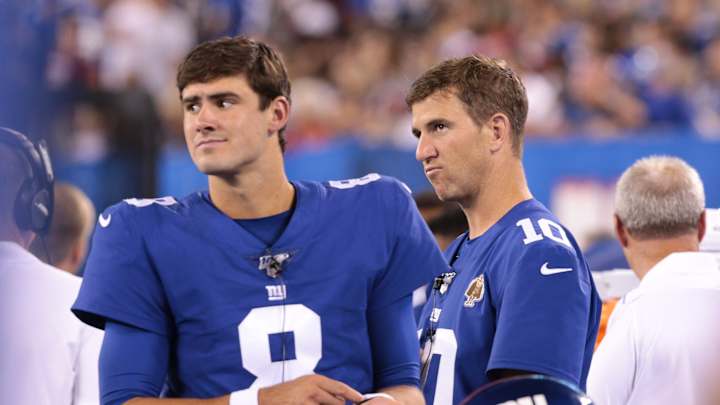The pros and cons of making a switch from Eli Manning to Daniel Jones

For months, the Giants, and especially head coach Pat Shurmur has insisted that Eli Manning was their starter.
At the same time, anyone who followed the team knew that to a certain degree, Manning’s status, unlike in previous years, was not set in stone.
That began with team ownership taking a “wait and see” approach with Manning’s contract, which expires this year, and it continued with the organization drooling over everything Jones, their sixth overall pick in the 2019 draft, accomplished in the off-season and preseason.
So now, with the Giants off to an 0-2 start and realistically needing a 2-2 finish to the first month of the season and with two upcoming opponents—the Bucs and Washington—having their own issues. Is the time right for the Giants to make a switch?
Shurmur said that by Wednesday, a decision would be made, but until then, here is a look at the factors that could go into the discussions Shurmur and the rest of the organization will be having.
Pro: The magnitude of this change could provide a much-needed spark.
Look, it’s not fair to blame Manning, who currently has a .500 regular-season record as the Giants starting quarterback, for all that has ailed this franchise since its last Super Bowl.
A large part of the blame could be laid at the feet of the organization for failing to surround Manning with talent on the offensive line and with coaching that, like Kevin Gilbride, took advantage of what Manning did well rather than trying to make him into something he’s never been.
However, a quarterback needs to be able to lift the team around him, and that’s something Manning hasn’t been able to do for a number of years.
Whereas just a few short years ago it was “as Manning goes, so too do the Giants,” of late, it’s been the other way around.
Pro: The offensive line is solid enough to support the switch.
One of the biggest arguments against starting Jones from the get-go was that the Giants, while optimistic that they got their offensive line right, needed to see the unit perform for a couple of games before reaching a conclusion.
So far, the return on the investment is positive. Manning has been sacked just twice this year, tying him with Case Keenum of Washington for the lowest (out of nine quarterbacks who have taken at least 80 dropbacks).
Having a solid offensive line in front of a young quarterback is essential toward building confidence and in helping the game slow down for the rookie because it will allow him to see the field and learn to make quicker reads without having to run for his life constantly.
Pro: Jones' mobility can help open up the playbook more.
Given how NFL offenses have evolved—and sadly the days of the classic pocket passer seem to be dwindling—having a mobile quarterback, which Manning is not, but which Daniel Jones is, could open up a lot more opportunities on offense for the Giants.
We’ve seen Manning struggle to make throws on the run of late because that’s just something that isn’t a strength. Yet it has become a part of today’s game and if a player can’t perform at a high enough level what’s expected of him to help a team win—and everything put into a game plan is supposedly geared toward accomplishing that goal—then it becomes painstakingly evident that a change needs to be considered.
Pro: It sends a message to the team that no one is untouchable.
Don’t underestimate the power behind this pro. If young players see a borderline Hall of Fame quarterback being benched in favor of a rookie die to performance, it sends a powerful message to the locker room that no one’s job is safe.
Granted, if Manning is benched, it won't be for lack of effort—you probably won’t find a harder working player in that locker room than Manning.
But this is a result-based business, and again, while the results aren’t all a result of what Manning has or hasn’t been doing, he can’t be excluded from the equation.
Con: Jones has limited regular-season experience.
Some might argue that the most significant drawback against starting Jones is that he’s only played in five forgettable regular-season snaps and doesn’t have experience outside of what he gained in the preseason.
Look, at some point, a player has to start somewhere—even Manning had to be thrown into the deep end with zero starting snaps, and he sure as heck took his lumps until things became more natural for him at this level.
If the Giants were 2-0, we probably wouldn’t even be having this discussion right now.
But they’re 0-2, and while they’re not mathematically eliminated from anything yet, the problem the Giants have on offense is, based on what we’ve seen through two games, this offense isn’t designed to take advantage of what Manning does best probably because of the personnel.
For example, Manning has historically done well with the deep ball, yet the Giants have attempted just seven deep passes (tied for 19th in the NFL with Derek Carr of the Raiders and Keenum), with Manning completing three deep passes for 98 yards and an interception.
The Giants offense has, over the years, evolved from a vertical passing attack s run by Gilbride to a system with more West Coast tendencies—shorter passes, crossing patterns, drag routes, etc. The idea here is to put the ball in the receivers’ hands and let them pick up YAC.
But when a play breaks down, and it becomes necessary to scramble, well, that’s never been Manning’s strength.
On 19 dropbacks in which he’s been under duress, he’s completed three passes. And while the offensive line has been much better with pass pro, to expect them to be perfect on every drop back is unrealistic.
The fact is that the Bills, int heir 28-14 win over the Giants, just s the Cowboys, in their win over the Giants the week before, made it a central point of their respective defensive strategies to make Manning beat them through the air.
In Week 2, the Bills started adding more men up in the box in the second half of the game to stop Saquon Barkley, in effect daring Manning to beat them.
He tried, engineering a touchdown drive in the fourth quarter that made it a seven-point game with plenty of time left, and yes, the defense didn’t help, but as time ticked on, Manning couldn’t get it done as he had back when he was “vintage Eli.”
Con: The Giants problems run deeper than at quarterback.
This is perhaps the biggest gamble the Giants would be taking if they were to make a switch because Manning obviously does not play defense, which has been just as big of an issue with this team.
However, a big problem on offense—and really the most glaring one—is on third down, where, per league stats, the Giants have converted on 21.74% of their attempts, well below the league average of 39.64%.
But does the fact that Jones has some mobility play a factor?
Shurmur was asked if he ever considered putting Jones in the game on third-and-long, and he said, “But your option of just putting a guy in there… the ability to run with the football in those pass rush type situations, typically the runs become scrambles where you drop back and throw.
"The quarterback run game is typically thought of and used more in shorter, third-down situations or first and second down, typically. Red zone, situational ball. Not usually on third and long.”
The Giants, for what it’s worth, have converted 25% of their all their third- and fourth-down plays this season, and are two of 3 in 3rd-and-1 situations and 2 of 5 on 4th down.
Con: The magnitude of this change could provide an unwanted distraction.
Shurmur has done his best to eliminate distractions from the Giants locker room and make it "all about ball."
But don’t think for a minute that if the change is made that the questions from the media to the players and coaches will have anything to do about the upcoming game against the Bucs.
Con: The Manning Presence.
If the Giants do make the switch to Jones, they’re unlikely to move Manning off the roster, which means he’ll be on the sideline looming.
While Manning is not the type of player to do anything to undermine another teammate and in fact will do what he can to help, a question the Giants must address is how they might handle any awkwardness that could ensue from the switch and if the rookie begins to struggle.
And if things get really bad, do the Giants stick with Jones or turn back to Manning, especially if a playoff berth is on the line? Logic would dictate that there is no going back, but that's another question Shurmur must be willing to answer before making up his mind.
There are many other factors that will go into this decision, which is probably why Shurmur didn’t want to get into a discussion with the media less than 24 hours after his team was dealt its second loss of the year.
Whatever decision he does make, let’s hope that there is also a plan to circumvent the distractions that are sure to follow.
Be sure to follow and like our Facebook page.
